Unit3_易混淆单词和短语辨析
Unit3 易混淆单词和短语剖析
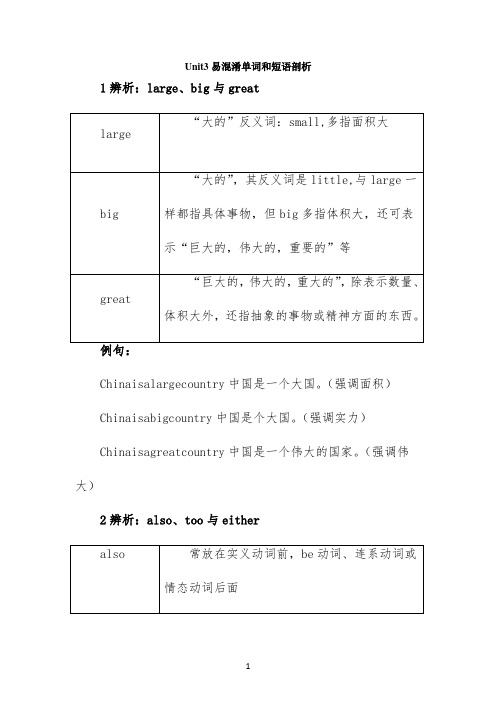
常用在肯定句中,也可用在表示委婉请求或希望得到肯定回答的疑问句中
IhavesomeEnglishboos我有一些英语书。
Wouldyouliesomedrins你想来点喝的吗
7辨析:own与have
own
“拥有“,强调具有法律上的所有权,其主语一般为人,其后多用表示有形物的名词作宾语
have
表示某人或某物“拥有、具有含有某人、某事物或某性质“,是比较客观的说法,强调所属关系
例句:
Whoownsthisland谁拥有这块地
Shehasdarhairandbrowneyes她有一头黑发和棕色的眼睛。
8辨析:few、afew、little与alittle
few
表示否定意义,意为“几乎没有”
修饰可数名词复数
例句:
Chinaisalargecountry中国是一个大国。(强调面积)
Chinaisabigcountry中国是个大国。(强调实力)
Chinaisagreatcountry中国是一个伟大的国家。(强调伟大)
2辨析:also、too与either
also
常放在实义动词前,be动词、连系动词或情态动词后面
afew
表示肯定意义,意为“有一些”
little
表示否定意义,意为“几乎没有”
修饰不可数名词
alittle
表示肯定意义,意为“有一点”
Unit3易混淆单词和短语剖析
1辨析:large、big与great
large
“大的”反义词:small,多指面积大
big
“大的”,其反义词是little,与large一样都指具体事物,但big多指体积大,还可表示“巨大的,伟大的,重要的”等
仁爱版英语八年级上册Unit3 Topic1 易混淆单词和短语辨析
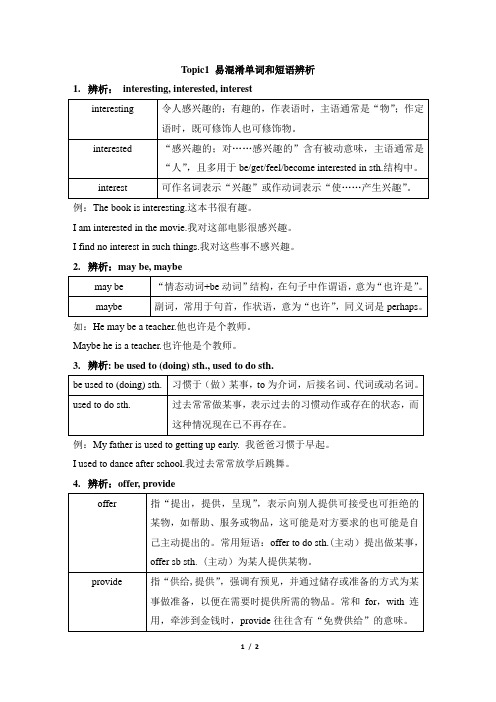
Topic1 易混淆单词和短语辨析
1.辨析:interesting, interested, interest
例:The book is interesting.这本书很有趣。
I am interested in the movie.我对这部电影很感兴趣。
I find no interest in such things.我对这些事不感兴趣。
2.辨析:may be, maybe
如:He may be a teacher.他也许是个教师。
Maybe he is a teacher.也许他是个教师。
3.辨析: be used to (doing) sth., used to do sth.
例:My father is used to getting up early. 我爸爸习惯于早起。
I used to dance after school.我过去常常放学后跳舞。
4.辨析:offer, provide
如:He offered me a job, but I didn’t accept.他提供给我一份工作,但我没有接受。
On Sundays his landlord provided dinner as well as breakfast.
周日,他的房东既为他提供早餐又提供晚餐。
5.辨析:everyday, every day
如:Let’s begin with everyday Eng lish. 让我们从日常英语开始学起。
The students walk to school every day. 学生们每天步行去学校。
七年级英语人教版下册Unit3_易混淆单词和短语辨析
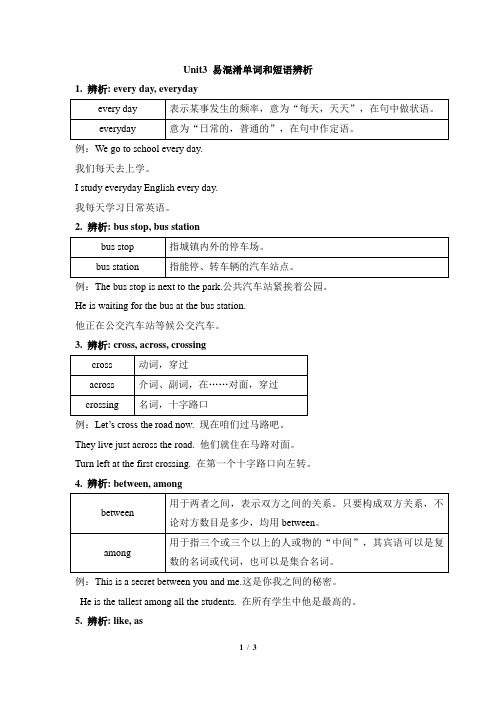
Unit3 易混淆单词和短语辨析1. 辨析: every day, everyday例:We go to school every day.我们每天去上学。
I study everyday English every day.我每天学习日常英语。
2. 辨析: bus stop, bus station例:The bus stop is next to the park.公共汽车站紧挨着公园。
He is waiting for the bus at the bus station.他正在公交汽车站等候公交汽车。
3. 辨析: cross, across, crossing例:Let’s cross the road now.现在咱们过马路吧。
They live just across the road. 他们就住在马路对面。
Turn left at the first crossing. 在第一个十字路口向左转。
4. 辨析: between, among例:This is a secret between you and me.这是你我之间的秘密。
He is the tallest among all the students. 在所有学生中他是最高的。
5. 辨析: like, as例:He talks to me like my father. 他像父亲那样跟我谈话。
(他不是我父亲)He talks to me as a father. 他以父亲的身份跟我谈话。
(他是我父亲)6. 辨析: have to, must例:You don’t have to tell him about it.你没必要把这件事告诉他。
You mustn’t tell him about it.你一定不要把这件事告诉他。
7. 辨析: leave for, leave...for..., leave from例:We are leaving for America tomorrow. 我们明天将动身去美国。
人教版八年级上册 Unit3 易混淆单词和短语辨析

人教版八年级上册 Unit3 易混淆单词和短语辨析Unit3 易混淆单词和短语辨析1.辨析:laugh, smilelaugh laugh指出声地“大笑”,表示高兴、喜悦等感情。
laughat嘲笑……。
smile smile指不出声地“微笑”,多指心情愉快,或对某人表示友好之意。
smile at对……微笑。
例:We all laughed loudly when she made a joke.她开了一个玩笑,我们都大声笑了。
He smiled to see the children so happy.看到孩子们这么幸福,他笑了。
2.辨析:win, beatwin 意为“赢得,打败,战胜”,后接war, game以及表示名次、奖品(金)等的名词作宾语。
beat 表示“打败,战胜”的意思,但后面只能接表示人的词作宾语。
如:He won a prize yesterday.他昨天得了一个奖。
We weren’t sure we could beat them.我们没有把握能打败他们。
3.辨析:like, aslike 意为“像……一样”。
(实际上不是)as 意为“作为,以……身份”。
(实际上就是)例:He talks to me like my father. 他像父亲那样跟我谈话。
(他不是我父亲)He talks to me as a father. 他以父亲的身份跟我谈话。
(他是我父亲)4.辨析:ago, beforeago为副词,意为“以前”,指从现在起到过去某一时间点以前。
因此,它通常和一般过去时连用,前面是一个表示时间段的词或短语。
before作副词,意为“以前”,是指从过去某一时间算起的一段时间以前,意思是“在那时以前”,它通常和现在完成时连用,有时也可以用于过去时的句子中,用来表示在某个时间点之前。
如:We studied in this school about two years ago.我们大约两年前在这所学校学message message意为“口信,短信,信息,电文”,是可数名词,用来指派人传去的消息,可以是口头的,也可以是书面的。
八年级英语译林版上册Unit3_易混淆单词和短语辨析
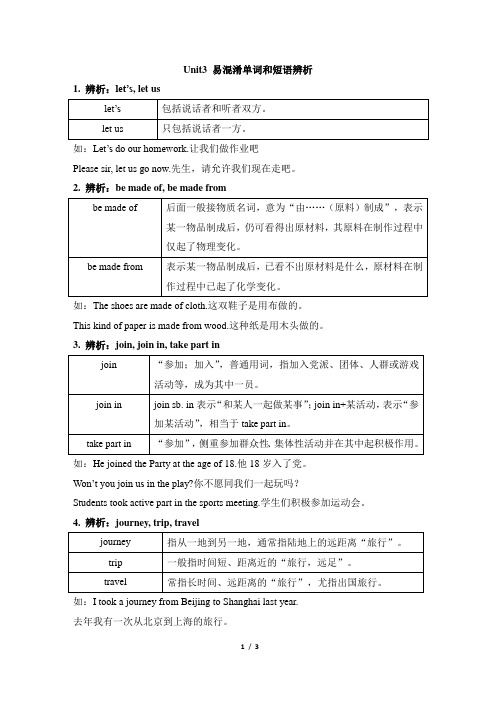
Unit3 易混淆单词和短语辨析1. 辨析:let’s, let us如:Let’s do our homework.让我们做作业吧Please sir, let us go now.先生,请允许我们现在走吧。
2. 辨析:be made of, be made from如:The shoes are made of cloth.这双鞋子是用布做的。
This kind of paper is made from wood.这种纸是用木头做的。
3. 辨析:join, join in, take part in如:He joined the Party at the age of 18.他18岁入了党。
Won’t you join us in the play?你不愿同我们一起玩吗?Students took active part in the sports meeting.学生们积极参加运动会。
4. 辨析:journey, trip, travel如:I took a journey from Beijing to Shanghai last year.去年我有一次从北京到上海的旅行。
They planned to make a wedding trip to Paris. 他们计划到巴黎旅行度蜜月。
My uncle is traveling in South America.我叔叔在南美洲旅行。
5. 辨析:get, arrive, reach例:I will get to Beijing in two days.= I will arrive in Beijing in two days.= I will reach Beijing in two days.我会在两天后到达北京。
What time did you get/arrive/reach home? 你是几点到家的?6. 辨析: happen, take place例:A funny thing happened in the subway yesterday.昨天地铁里发生了一件有趣的事。
牛津译林版英语九年级下册Unit3 易混淆单词和短语辨析 练习
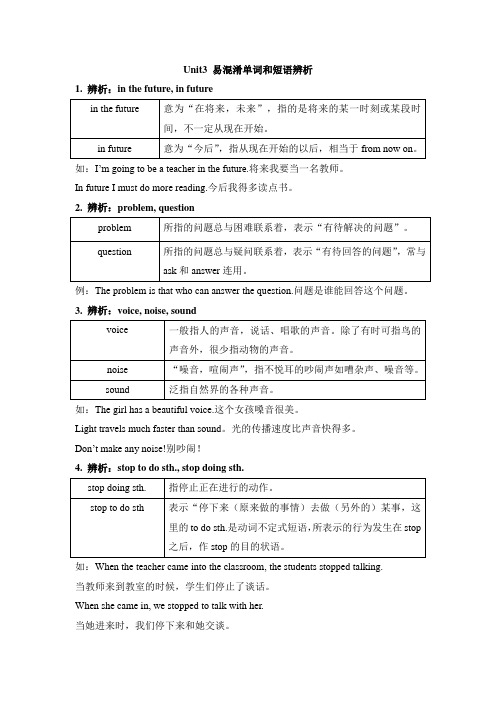
Unit3 易混淆单词和短语辨析1. 辨析:in the future, in future如:I’m going to be a teacher in the future.将来我要当一名教师。
In future I must do more reading.今后我得多读点书。
2. 辨析:problem, question例:The problem is that who can answer the question.问题是谁能回答这个问题。
3. 辨析:voice, noise, sound如:The girl has a beautiful voice.这个女孩嗓音很美。
Light travels much faster than sound。
光的传播速度比声音快得多。
Don’t make any noise!别吵闹!4. 辨析:stop to do sth., stop doing sth.如:When the teacher came into the classroom, the students stopped talking.当教师来到教室的时候,学生们停止了谈话。
When she came in, we stopped to talk with her.当她进来时,我们停下来和她交谈。
5. 辨析:little, a little, a few, few如:She knows little French but a little English.她几乎不懂法语,但懂一点英语。
I have few friends here.在这我没有朋友。
A few students come from Shandong.一些学生来自山东。
6. 辨析:sometimes, some times, sometime, some time如:She comes to visit us sometimes.她有时来看望我们。
八年级英语上册Unit3OurHobbiesTopic3Whatwereyoudoingatthistimeyesterday易混淆单词和短语辨析新版仁爱版
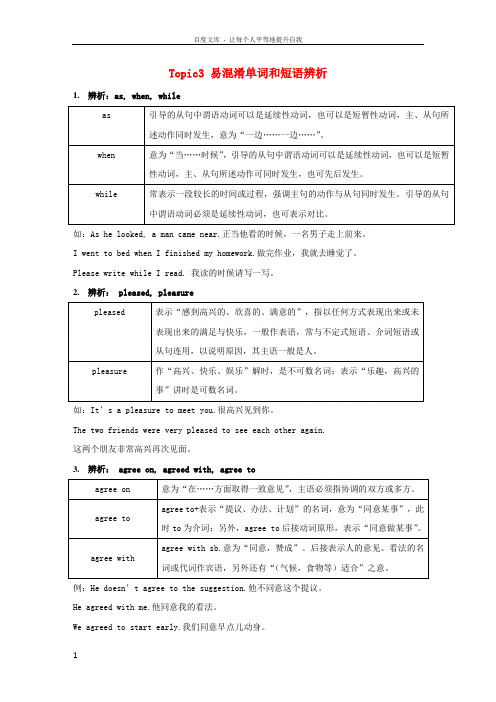
Topic3 易混淆单词和短语辨析1.辨析:as, when, whileas 引导的从句中谓语动词可以是延续性动词,也可以是短暂性动词,主、从句所述动作同时发生,意为“一边……一边……”。
when 意为“当……时候”,引导的从句中谓语动词可以是延续性动词,也可以是短暂性动词,主、从句所述动作可同时发生,也可先后发生。
while 常表示一段较长的时间或过程,强调主句的动作与从句同时发生。
引导的从句中谓语动词必须是延续性动词,也可表示对比。
如:As he looked, a man came near.正当他看的时候,一名男子走上前来。
I went to bed when I finished my homework.做完作业,我就去睡觉了。
Please write while I read. 我读的时候请写一写。
2.辨析: pleased, pleasurepleased 表示“感到高兴的、欣喜的、满意的”,指以任何方式表现出来或未表现出来的满足与快乐,一般作表语,常与不定式短语、介词短语或从句连用,以说明原因,其主语一般是人。
pleasure 作“高兴、快乐、娱乐”解时,是不可数名词;表示“乐趣,高兴的事”讲时是可数名词。
如:It’s a pleasure to meet you.很高兴见到你。
The two friends were very pleased to see each other again.这两个朋友非常高兴再次见面。
3.辨析: agree on, agreed with, agree toagree on 意为“在……方面取得一致意见”,主语必须指协调的双方或多方。
agree to+表示“提议、办法、计划”的名词,意为“同意某事”,此agree to时to为介词;另外,agree to后接动词原形,表示“同意做某事”。
agree with sb.意为“同意,赞成”。
后接表示人的意见、看法的名agree with词或代词作宾语,另外还有“(气候,食物等)适合”之意。
Unit3 易混淆单词和短语辩析
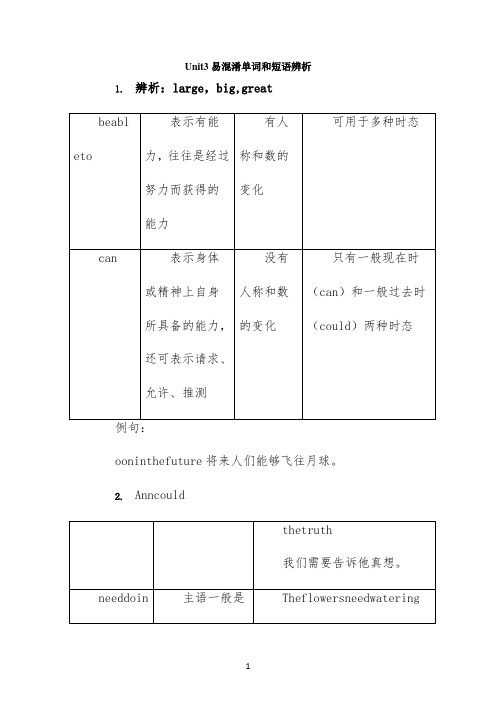
2.Anncould
thetruth
我们需要告诉他真想。
needdoingsth
主语一般是物。needdoing还可用needtobedone来替换
Theflowersneedwatering
=Theflowersneedtobewatered
3.辨析:what’,与
这张课桌是木质的。
bemadefrom
“由……制成”,强调从成品上已看不出原材料,或发生的是化学变化
Theadefromwood这纸是由木材做的。
bemadein
“在某个地方制造”,in后接表示地点的名词
ThewatcharemadeinShanghai
这些表是上海生产的。
5辨析:which与what
ewarm-bloodedanimals,lie/suchasthecat,thedogorthewolf,donotneedtohibernate
一些温血动物,像猫、狗或狼都不需要冬眠。
foream
ple,airisinvisible
例如,空气是看不见的。
Unit3易混淆单词和短语辨析
1.辨析:large,big,great
beableto
表示有能力,往往是经过努力而获得的能力
有人称和数的变化
可用于多种时态
can
表示身体或精神上自身所具备的能力,还可表示请求、允许、推测
没有人称和数的变化
只有一般现在时(can)和一般过去时(could)两种时态
例句:
which
哪一个;哪一些
在已知的人或物中进行选择
可以被of短语修饰
what
什么
【仁爱英语 Unit 3 Getting Together】Topic1_易混淆单词和短语辨析
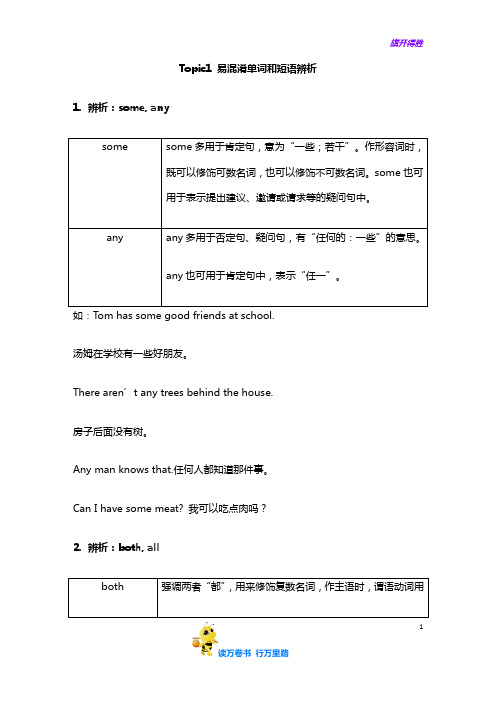
Topic1 易混淆单词和短语辨析1.辨析:some, anysome some多用于肯定句,意为“一些;若干”。
作形容词时,既可以修饰可数名词,也可以修饰不可数名词。
some也可用于表示提出建议、邀请或请求等的疑问句中。
any any多用于否定句、疑问句,有“任何的:一些”的意思。
any也可用于肯定句中,表示“任一”。
如:Tom has some good friends at school.汤姆在学校有一些好朋友。
There aren’t any trees behind the hous e.房子后面没有树。
Any man knows that.任何人都知道那件事。
Can I have some meat? 我可以吃点肉吗?2.辨析:both, allboth 强调两者“都”,用来修饰复数名词,作主语时,谓语动词用1复数形式。
all 指三者或三者以上“都”,既可以指人,也可以指物,指人时是“复数”概念,作主语,谓语动词用复数形式,指物时是“单数”概念,作主语时,谓语动词用单数形式。
如:We are both students.我们都是学生。
All goes well.一切顺利。
3.辨析: a little, littlea little a little一点儿,一些,修饰不可数名词。
little little很少,几乎没有,倾向于否定,也修饰不可数名词。
如:There is a little milk left in the bottle.瓶子里还剩一点儿牛奶。
There is little food in the fridge.冰箱里几乎没有什么食物了。
4.辨析:a lot, a lot of2a lot a lot有“许多,大量;非常”的意思,在句中分别作宾语和状语。
a lot of a lot of许多,大量,后接复数名词或不可数名词,在句中作定语。
例:We can learn a lot from Miss Wang.我们可以从王老师身上学到很多。
冀教版英语七年级上册_Unit3_易混淆单词和短语辨析
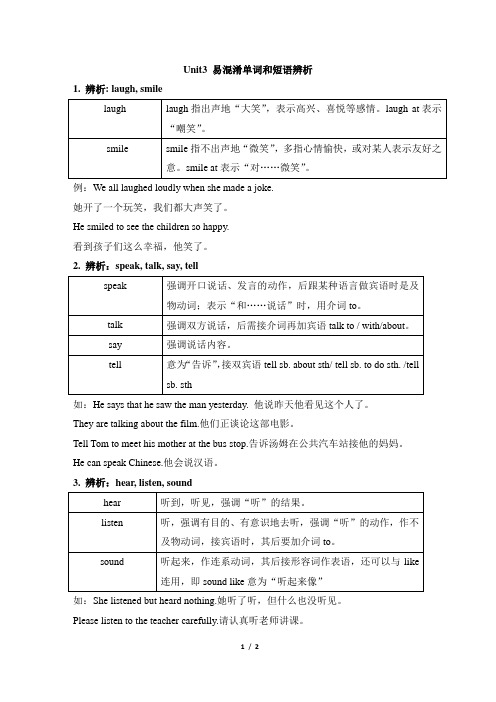
Unit3 易混淆单词和短语辨析1. 辨析: laugh, smile例:We all laughed loudly when she made a joke.她开了一个玩笑,我们都大声笑了。
He smiled to see the children so happy.看到孩子们这么幸福,他笑了。
2. 辨析:speak, talk, say, tell如:He says that he saw the man yesterday. 他说昨天他看见这个人了。
They are talking about the film.他们正谈论这部电影。
Tell Tom to meet his mother at the bus stop.告诉汤姆在公共汽车站接他的妈妈。
He can speak Chinese.他会说汉语。
3. 辨析:hear, listen, sound如:She listened but heard nothing.她听了听,但什么也没听见。
Please listen to the teacher carefully.请认真听老师讲课。
That sounds good.那听起来不错。
4. 辨析:be angry with, be angry at如:The teacher is angry with the students.老师对学生们感到生气。
He was angry at what she said.他对她所说的话大为恼火。
5. 辨析:mean to do, mean doing如:I mean to praise these students.我打算表扬这些学生。
I mean giving the students more practice.我的意思是给学生们更多的练习。
6. 辨析:a little, a bit如:There is a little water in the bottle.瓶子里有一点儿水。
人教_高一英语必修三_Unit3_易混易错辨析
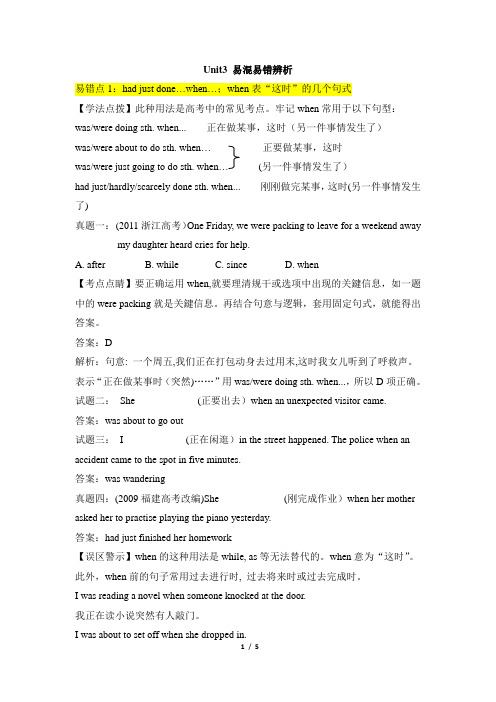
Unit3 易混易错辨析易错点1:had just done…when…;when表“这时”的几个句式【学法点拨】此种用法是高考中的常见考点。
牢记when常用于以下句型:was/were doing sth. when... 正在做某事,这时(另一件事情发生了)was/were about to do sth. when…正要做某事,这时was/were just going to do sth. when… (另一件事情发生了)had just/hardly/scarcely done sth. when... 刚刚做完某事,这时(另一件事情发生了)真题一:(2011浙江高考)One Friday, we were packing to leave for a weekend away ________ my daughter heard cries for help.A. afterB. whileC. sinceD. when【考点点睛】要正确运用when,就要理清规干或选项中出现的关鍵信息,如一题中的were packing就是关鍵信息。
再结合句意与逻辑,套用固定句式,就能得出答案。
答案:D解析:句意: 一个周五,我们正在打包动身去过用末,这时我女儿听到了呼救声。
表示“正在做某事时(突然)……”用was/were doing sth. when...,所以D项正确。
试题二:She ____________(正要出去)when an unexpected visitor came.答案:was about to go out试题三:I ____________(正在闲逛)in the street happened. The police when an accident came to the spot in five minutes.答案:was wandering真题四:(2009福建高考改编)She ____________ (刚完成作业)when her mother asked her to practise playing the piano yesterday.答案:had just finished her homework【误区警示】when的这种用法是while, as等无法替代的。
人教版英语九年级全册Unit3 易混淆单词和短语辨析
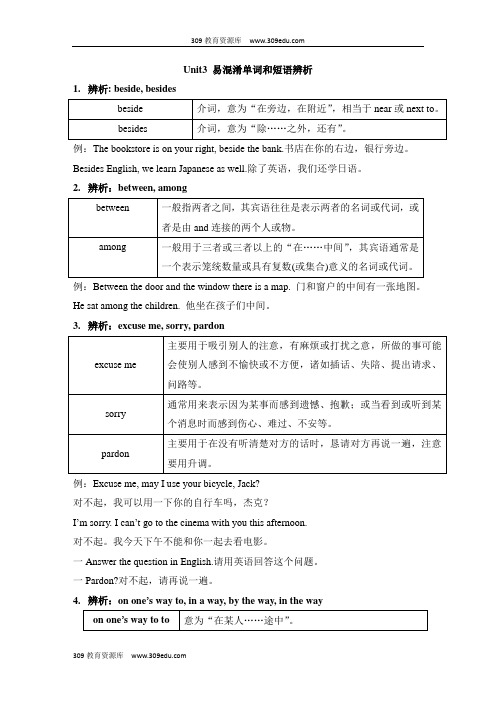
Unit3 易混淆单词和短语辨析1.辨析: beside, besides例:The bookstore is on your right, beside the bank.书店在你的右边,银行旁边。
Besides English, we learn Japanese as well.除了英语,我们还学日语。
2.辨析:between, among例:Between the door and the window there is a map. 门和窗户的中间有一张地图。
He sat among the children. 他坐在孩子们中间。
3.辨析:excuse me, sorry, pardon例:Excuse me, may I use your bicycle, Jack?对不起,我可以用一下你的自行车吗,杰克?I’m sorry. I can’t go to the cinema with you this afternoon.对不起。
我今天下午不能和你一起去看电影。
一Answer the question in English.请用英语回答这个问题。
一Pardon?对不起,请再说一遍。
4.辨析:on one’s way to, in a way, by the way, in the way例:I met an old friend of mine on my way to the station.在去车站的途中,我碰见了我的一位老朋友。
You are right in a way. 在某种程度上你是正确的。
By the way, could you tell me how much it is?顺便问一下,这个东西多少钱?Your car is in the way.你的小汽车挡路了。
5.辨析:scary, scared例:The movie is really scar这电影真恐怖。
- 1、下载文档前请自行甄别文档内容的完整性,平台不提供额外的编辑、内容补充、找答案等附加服务。
- 2、"仅部分预览"的文档,不可在线预览部分如存在完整性等问题,可反馈申请退款(可完整预览的文档不适用该条件!)。
- 3、如文档侵犯您的权益,请联系客服反馈,我们会尽快为您处理(人工客服工作时间:9:00-18:30)。
Unit3 易混淆单词和短语辨析
1.辨析:laugh, smile
例:We all laughed loudly when she made a joke.她开了一个玩笑,我们都大声笑了。
He smiled to see the children so happy.看到孩子们这么幸福,他笑了。
2.辨析:win, beat
如:He won a prize yesterday.他昨天得了一个奖。
We weren’t sure we could beat them.我们没有把握能打败他们。
3.辨析:like, as
例:He talks to me like my father. 他像父亲那样跟我谈话。
(他不是我父亲)
He talks to me as a father. 他以父亲的身份跟我谈话。
(他是我父亲)
4.辨析:ago, before
如:We studied in this school about two years ago.我们大约两年前在这所学校学习。
They came here before this week.他们是在这个星期前来这儿的。
5.辨析:soon, quickly, fast
如:Please call me soon.请尽快给我发电话。
He quickly got up and went on running.他迅速起来,继续跑。
He runs fast.他跑得快。
6.辨析: true, real, really
例:The news is true.这消息是真的。
Most of what he says is true.他说的话大部分是真实的。
It’s not a toy gun; it’s the real thing.它不是一把玩具枪,而是一把真枪。
I’m not really interested in fishing.我不是真的对钓鱼感兴趣。
7.辨析: news, information, message
例:I have some good news for you.我有好消息告诉你。
There is much information in this book.这本书里有许多资料。
I’m sorry, she’s out right now. Can I take a message?
对不起,她这儿会出去了。
要我传个话吗?
8.辨析:another, the other, the others, others
如:I don’t like this book; please give me another one.
我不喜欢这本书;请给我另外一本。
I have two pens; one is red, the other is blue.
我有两支钢笔;一支是红的,另一支是蓝的。
There are fifty students in our class, of which twenty are from the countryside and the others are from the city.
我们班有50个学生,其中20个来自农村,其余的都来自城市。
He is my friend, who is always ready to help others.
他是我的朋友,一个总是乐于助人的人。
9.辨析:loud, aloud, loudly
如:She has a very loud voice. 她有非常响亮的嗓音。
Speak loud while answering the teache r’s que stions.回答老师的问题要大声一点。
The teacher asked him to read this poem aloud.老师叫他大声朗读这首诗。
Suddenly she began to shriek loudly.突然她开始大声尖叫起来。
10.辨析:care for, take care of, care about
如:I hope all the students in our class will care for each other.
我希望我们班上的所有同学会互相关心。
I d on’t care for green tea.我不喜欢绿茶。
He doesn’t care about his clothes.他不讲究衣着。
You must take good care of yourself.你必须好好照顾你自己。
